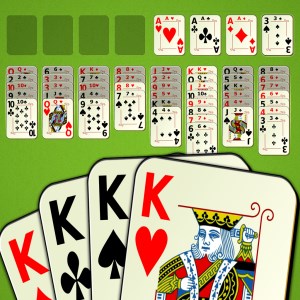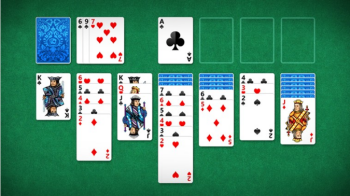Microsoft Freecell
Posted By admin On 09/04/22- Old Freecell On Windows 10
- Microsoft Freecell Windows 10
- Microsoft Freecell Solitaire Download
- Microsoft Freecell 10
FreeCell Rules

FreeCell is a solitaire game that was made popular by Microsoft in the 1990s. One of its oldest ancestors is Eight Off. In the June 1968 edition of Scientific American Martin Gardner described in his 'Mathematical Games' column, a game by C. Baker that is similar to FreeCell, except that cards on the tableau are built by suit instead of by alternate colors. Tech support scams are an industry-wide issue where scammers trick you into paying for unnecessary technical support services. You can help protect yourself from scammers by verifying that the contact is a Microsoft Agent or Microsoft Employee and that the phone number is an official Microsoft global customer service number. Play online a beautiful FreeCell solitaire game. Includes 4 different FreeCell favorites! Play now for free, no download or registration required.
The different piles
There are three different types of piles in FreeCell Solitaire. They are:
- The Free Cells: The four piles in the upper left corner.
- The Foundations: The four piles in the upper right corner.
- The Tableau: The eight piles that make up the main table.
The setup
The Tableau piles are numbered from 1 to 8, piles 1-4 start with 7 cards each, piles 5-8 with 6 cards each. The Foundations and Free Cells are empty.
The objective
To win FreeCell, you must get all the cards onto the Foundations. The Foundations are ordered by suit and rank, each Foundation has one suit and you must put the cards onto them in the order Ace 2 3 4 5 6 7 8 9 10 Jack Queen King. To do that you can use the moves described below:
Allowed moves
- Move one or more cards from one Tableau pile to another. You can move the top card of a pile on the Tableau onto another Tableau pile, if that pile's top card is one higher than the moved card and in a different color. For example, you could move a red 6 onto a black 7. If the top cards on a Tableau pile are ordered, e.g. you have red 6, black 5, red 4 as the top cards, then you can click the red 6 and move all of them together onto another Tableau pile that has a black 7 as its top card. HOWEVER, there is a limitation to how many ordered cards you can move together. The number of cards you can move together is basically the number of empty free cells and empty tableaus + 1. So, if you have 2 free cells empty you can move 3 cards together. If you have all 4 free cells empty you can move 5 cards. If you have 3 free cells and 4 empty tableaus you can move 8 cards together. Moving many cards together is basically just a convenience the game provides. In the strictest sense you should always move one at a time, but if you have 4 ordered cards and 3 free cells then you could trivially move the top 3 ordered cards to the free cells, then move the fourth card and then move the 3 cards from the free cells back onto the fourth card. So, for convenience the game allows you to move n+1 cards together, where n is the number of free cells.
If you have an empty Tableau pile then you can move any card there. - Move a single card onto a Free Cell. You can always move the top card of any Tableau Pile, Free Cell or Foundation onto a Free Cell if it's empty. Free Cell's can only hold a single card at a time.
- Move a card from a Free Cell. You can move a card from a Free Cell onto a Foundation if it's in the same suit and one higher than the Foundation's top card. Or you can move a card from a Free Cell onto a Tableau pile if the card is one lower and in a different color than the Tableau pile's top card. E.g. you could move a red 5 from a Free Cell onto a Tableau pile where the current top card was a black 6.
- You can move a Tableau card onto the Foundations. You can either drag the cards onto the Foundation, or just double click it and then it will go there by itself. When the Free Cells are empty and all cards on the Tableau are arranged in 4 piles and each of the piles has been ordered in descending order with alternating red/black cards then the Tableau will clear itself, since at that point you are guaranteed to win the game.
- You can Undo as many times as you like. The game offers unlimited undos. Each Undo counts as a new move though, so if you're trying to win the game in as few moves as possible you should be careful about how many undos you use.
Time and Moves
The game counts the moves you make, and measures the time it takes to finish the game, so you can compete against your previous best games if you want. Currently this data is not stored anywhere, in the future I might add some kind of high scores.

About FreeCell
Hi. My name is Einar Egilsson and I made this online verson of FreeCell. FreeCell is the second solitaire game I create, before that I created Klondike (or 'classic' solitaire) and I've also made a few card games like Hearts, Spades and Whist.
If you have any questions, comments or requests for other solitaire games you can send them to admin@cardgames.io or tweet at me @cardgames_io. If you have any errors or problems when playing the game please include which browser you're using when you email me, it makes figuring out the problem a lot easier :)
Many thanks go to Nicu Buculei, who created the excellent playing card images that I use for the game.

If you like this game check out my various other games, and please share them on Facebook/Twitter/Google+
This is version 2887 of FreeCell.
This website uses cookies to store your preferences, and for advertising purposes. Read more in our Privacy Policy or manage your privacy settings.
| Original author(s) | Jim Horne |
|---|---|
| Developer(s) | Microsoft |
| Initial release | 1991; 30 years ago |
| Operating system | Microsoft Windows |
| Platform | IA-32, x86-64 (and historically DEC Alpha, Itanium, MIPS, and PowerPC) |
| Successor | Microsoft Solitaire Collection (Windows 10) |
| Type | Computer game |
FreeCell, also known as Microsoft FreeCell,[1] is a computer game included in Microsoft Windows,[2] based on a card game with the same name.
Development[edit]
Paul Alfille implemented Freecell in 1978 for the PLATO computer system at CERL; by the early 1980s Control Data Corporation had published it for all PLATO systems. Jim Horne, who enjoyed playing Freecell on the PLATO system at the University of Alberta, published a shareware $10 DOS version with color graphics in 1988. That year Horne joined Microsoft, and later ported the game to Windows.[3]
The Windows version was first included in Microsoft Entertainment Pack Volume 2 and later the Best Of Microsoft Entertainment Pack.[4] It was subsequently included with Win32s as an application that enabled the testing of the 32-bitthunking layer to ensure that it was installed properly.[5] However, FreeCell remained relatively obscure until it was released as part of Windows 95.[6] In Windows XP, FreeCell was extended to support a total of 1 million card deals.[4]
Releases[edit]

Today, there are FreeCell implementations for nearly every modern operating system as it is one of the few games pre-installed with every copy of Windows. Prior to Windows Vista, the versions for Windows were limited in their player assistance features, such as retraction of moves. The Windows Vista FreeCell implementation contains basic hints and unlimited move retraction (via the Undo menu choice or command),[7] and the option to restart the game. Some features have been removed, such as the flashing screen to warn the player of one move remaining. FreeCell is not included in the Windows 8 operating system but is available in the Windows Store as the free Microsoft Solitaire Collection, which is also bundled with Windows 10.
Legacy[edit]
Microsoft created the Entertainment Packs to encourage non-business use of Windows. According to company telemetry FreeCell was the seventh most-used Windows program, ahead of Word and Microsoft Excel.[3]
Old Freecell On Windows 10
The original Microsoft FreeCell package supports 32,000 numbered deals, generated by a 15-bit, pseudorandom-numberseed. These deals are known as the 'Microsoft 32,000',[4] and all but one of them have been completed.[6] Later versions of FreeCell include more than one million deals.[4] When Microsoft FreeCell became very popular during the 1990s, the Internet FreeCell Project attempted to solve all the deals by crowdsourcing consecutive games to specific people. The project ran from August 1994 to April 1995, and only #11982 proved unwinnable.[8] Out of the current Microsoft Windows games, eight are unsolvable.[9][10]
Microsoft Freecell Windows 10
The significance of the 'Microsoft 32,000' to many FreeCell players is such that other computer implementations of FreeCell will often go out of their way to guarantee compatibility with these deals, rather than simply using the most readily available random number generator for their target platforms.[4][11]
References[edit]
Microsoft Freecell Solitaire Download
- ^'FreeCell Stops Responding When You Click Undo'. Support. Microsoft. January 23, 2007. Archived from the original on February 6, 2007. Retrieved January 20, 2017.
- ^Rubenking, Neil J. (March 4, 1997). 'User-to-User'. PC Magazine. p. 271. Retrieved January 20, 2017.
- ^ abDear, Brian (2017). '27. Leaving the Nest'. The Friendly Orange Glow. New York: Pantheon Books. pp. 501–503. ISBN9781101871560.
- ^ abcdeKeller, Michael (2005). 'FreeCell - Frequently Asked Questions (FAQ)'. Solitaire Laboratory. Retrieved January 20, 2017.
- ^'How to Troubleshoot Win32s Installation Problems'. Microsoft. May 21, 1998. Archived from the original on July 12, 2010. Retrieved July 12, 2010.
- ^ abKaye, Ellen (October 17, 2002). 'One Down, 31,999 to Go: Surrendering to a Solitary Obsession'. New York Times. Retrieved January 20, 2017.
- ^Rubenking, Neil J. (January 2008). 'Ask Neil'. PC Magazine. p. 124. Retrieved June 12, 2012.
- ^O'Reilly, Tim; Mott, Troy; Glenn, Walter J. (September 2, 1999). Windows 98 in a Nutshell. O'Reilly Media, Inc. pp. 199–. ISBN9781565924864. Retrieved June 12, 2012.
- ^Leonhard, Woody (September 15, 2009). Windows 7 All-In-One for Dummies. John Wiley & Sons. pp. 293–. ISBN9780470487631. Retrieved June 12, 2012.
- ^'FreeCell lists of difficult (and extra easy) deals'. Solitaire Laboratory. March 13, 2010. Retrieved February 7, 2018.
- ^'PySol - Rules for Freecell'. PySolFC documentation. Retrieved February 3, 2018.